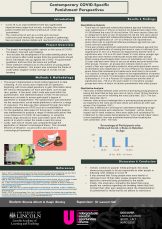By Haajir Booley & Shania Albutt //

 For this research, we worked with Dr Lauren Hall as our supervisor to investigate public opinion on the issue of Covid-19 related rule breaking and crime. Additionally, this project examined the theme of youth within negative media coverage of Covid rule breaking. This project is timely as Covid-19 has changed and impacted many aspects of society, including our criminal justice system and what acts were socially constructed as crimes.
For this research, we worked with Dr Lauren Hall as our supervisor to investigate public opinion on the issue of Covid-19 related rule breaking and crime. Additionally, this project examined the theme of youth within negative media coverage of Covid rule breaking. This project is timely as Covid-19 has changed and impacted many aspects of society, including our criminal justice system and what acts were socially constructed as crimes.
 We faced numerous challenges during the process of conducting this project. Working collaboratively remotely was challenging as it made the process less direct and efficient. Secondly, during the conceptualisation of this project, many changes happened in regard to pandemic rules and guidance. For example, the second lockdown ended, mass vaccination happened, and restrictions lifted. Having to keep up with news and policy changes meant our survey questions needed to be carefully considered to ensure they would still be relevant and yield accurate data by the time the survey was released.
We faced numerous challenges during the process of conducting this project. Working collaboratively remotely was challenging as it made the process less direct and efficient. Secondly, during the conceptualisation of this project, many changes happened in regard to pandemic rules and guidance. For example, the second lockdown ended, mass vaccination happened, and restrictions lifted. Having to keep up with news and policy changes meant our survey questions needed to be carefully considered to ensure they would still be relevant and yield accurate data by the time the survey was released.
We learnt how to be effective researchers by developing research skills to analyse survey responses and data sets. Our research results found no significant relationship between someone’s age and following the results. No particular age group in our sample were more or less likely to follow lockdown rules. This is contrary to the media’s assumption younger people are largely responsible. However, we found with the exception of The Guardian, the theme of youth was largely negative in the media’s portrayal. We also found younger people were more scared to leave the house during the pandemic, contradicting media conceptions of young people as reckless or selfish. In relation to punishment, younger people agreed more than older people that harsher punishments should be put in place for breaking Covid-19 rules. Females and people whose family followed the rules were also more likely to agree with this.
Working collaboratively with our supervisor was a positive experience, as Lauren added expert insight and edits into drafts and documents that otherwise would not have been suggested.
This experience will help us prepare for our future as we are both more prepared for our upcoming dissertation. We now have first-hand experience of conducting and analysing research, including submitting ethics forms, working in a timely manner, and learning research skills. Additionally, we both want to pursue postgraduate study in law, so conducting primary research has equipped us with skills needed to succeed in this field.
*To view Haajir and Shania’s research poster and presentation recording, please click on the thumbnails below:

